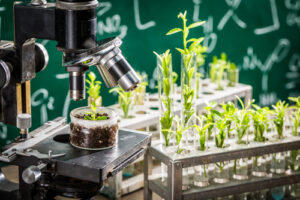During the past year I’ve been doing research here at Farmingdale with Dr. Kerry Lutz, on the plant Brassica napus. I found out about this opportunity through my RAM program advisor and have been working twice a week in the labs here at Farmingdale. After doing this research with Dr. Lutz, her project that she has brought me onto has been also been worked on with Dr. Maliga at Rutgers University. We are constantly comparing our results and helping each other in order to make our research work, and this project is also being worked on at Rutgers University. Me, as well as another RAM student, Kelly Enriquez, got the opportunity to spend the entire summer living at Rutgers University, working alongside Dr. Maliga and his PhD students, to work on our research with chloroplast transformations in Arabidopsis. It was such an amazing opportunity I got, and I learned so much from working alongside the PhD students. I learned a lot about the project itself, but from this internship I learned a lot about what it takes to be a PhD student. I worked there Monday through Friday, 9 a.m. – 5 p.m., and was in the lab doing research with so many plates of plants. I was also able to attend official lab meetings and saw how they are run, as well as how to properly present your research.
The work I did in the lab with Kelly was fun, tedious and very delicate, due to keeping our work as sterile as possible to avoid any contaminations with the plants. We took different ecotypes of the Arabidopsis plant and bombarded their roots with gold particles with selected plasmids. These were then monitored for weeks on selective medium, where the roots grew and if we were lucky developed shoots (small plants). It was very tedious work having to change out their plates multiple times and spreading out the roots, as well as making the medium that the roots needed to grow on. Working in the lab with the PhD student Lisa, she taught us valuable skills in the lab, such as bombarding plants, cloning DNA, making media, and even properly organizing and recording all our research using Excel and a proper notebook.
It was tricky learning all about working under the hood because it has special vents to give proper air circulation to prevent any contamination from the atmosphere outside of the hood, because there is bacteria and germs in the air all around us so in order to keep my plants alive I had to make sure that the environment they were in was completely sterile. Part of keeping it sterile, I would spray ethanol all over the inside of the hood and wipe it down thoroughly before placing anything in the hood, and when I did put anything in the hood I would spray my hands as well as the objects with ethanol, to kill any germs that may have been on them. Keeping a sterile environment in the lab was very crucial for my experiments to work. There were contaminations at times, which was disappointing to see, but I learned to be able to accept it, record what happened, and document what could have caused the contamination in order to prevent it for the next time I tried it again. When obstacles came in the way I learned how to accept them, as well as work past them whether it be changing a protocol, or even learning how to make a certain chemical when you have completely run out. I learned so many techniques and lab procedures by working alongside a PhD student.
From this experience I learned how hard it is to be a PhD student, having to make your own procedures, as well as major problem-solving skills. I learned so much from working in the lab and Kelly and I were able to present our research at the end of the internship at a poster presentation with other students that conducted research at Rutgers that summer. So now after that long and fun summer at Rutgers, I am continuing the research with Rutgers here at Farmingdale State College with Dr. Lutz. The work I did over the summer gave me a lot of practice and skills that I’ll continue to use while working with Dr. Lutz. Doing this summer internship at Rutgers really helped me grow as a Bioscience student here at Farmingdale, and will also help me greatly later on when I am applying for jobs in the field of my choosing. Whichever path I choose as a Bioscience major, internships and lots of research will look great on resumes, and shows how much hands-on experience I have done. I always recommend to other students, whichever major they are in, to get involved with research and internships because it helps get a feel of what you want to do in the future, before you commit to doing it. You get to experience the day in the life of a PhD student and see if that’s what you’d want to do in the future. The experience I had this summer at Rutgers University was so incredible and I’m glad I’m able to continue my research here at Farmingdale State College.
